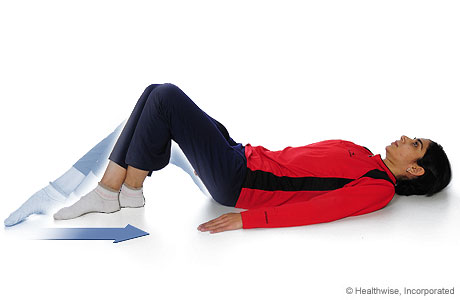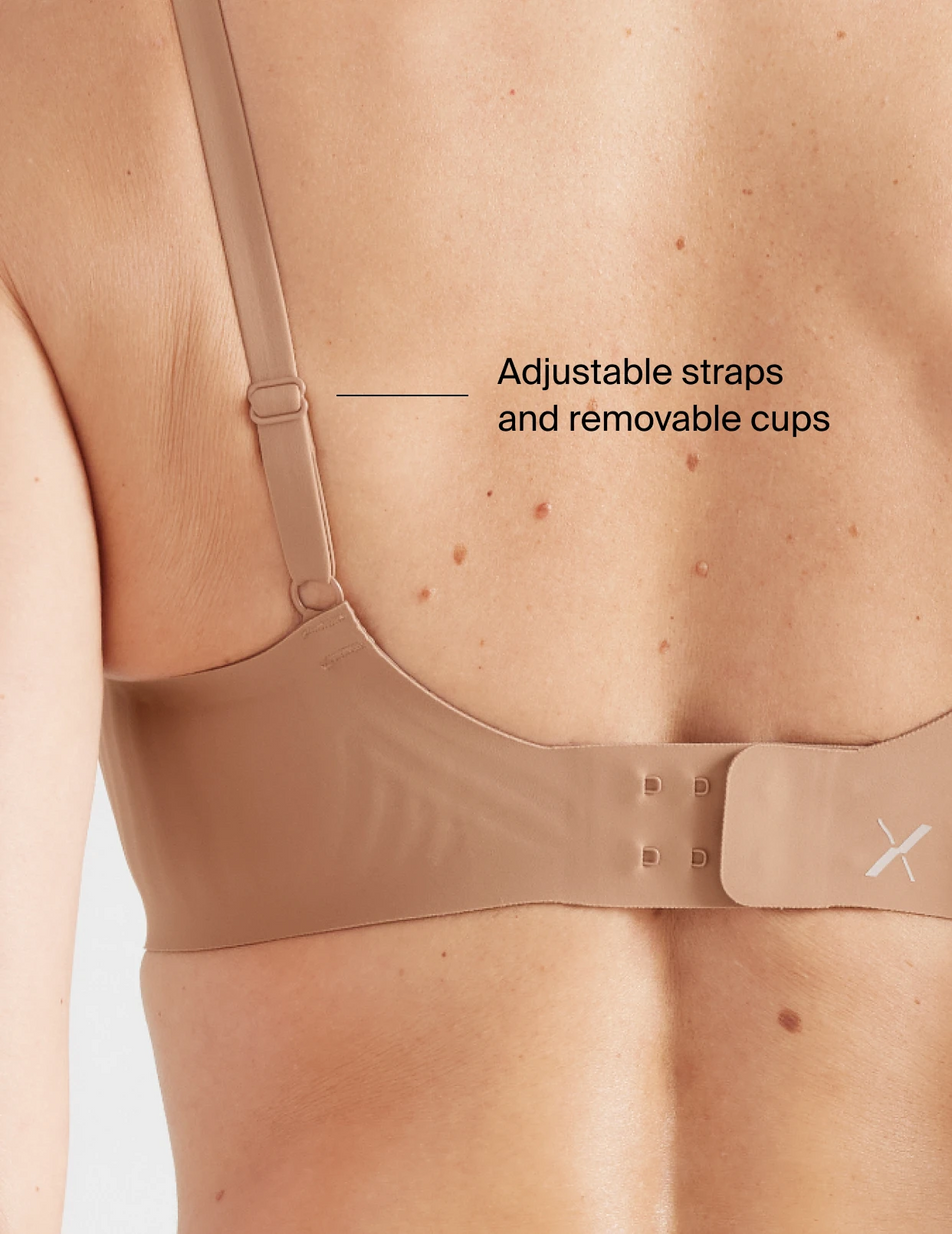Exercise Treatment Plan for Knee Injury Post Surgery - ppt video
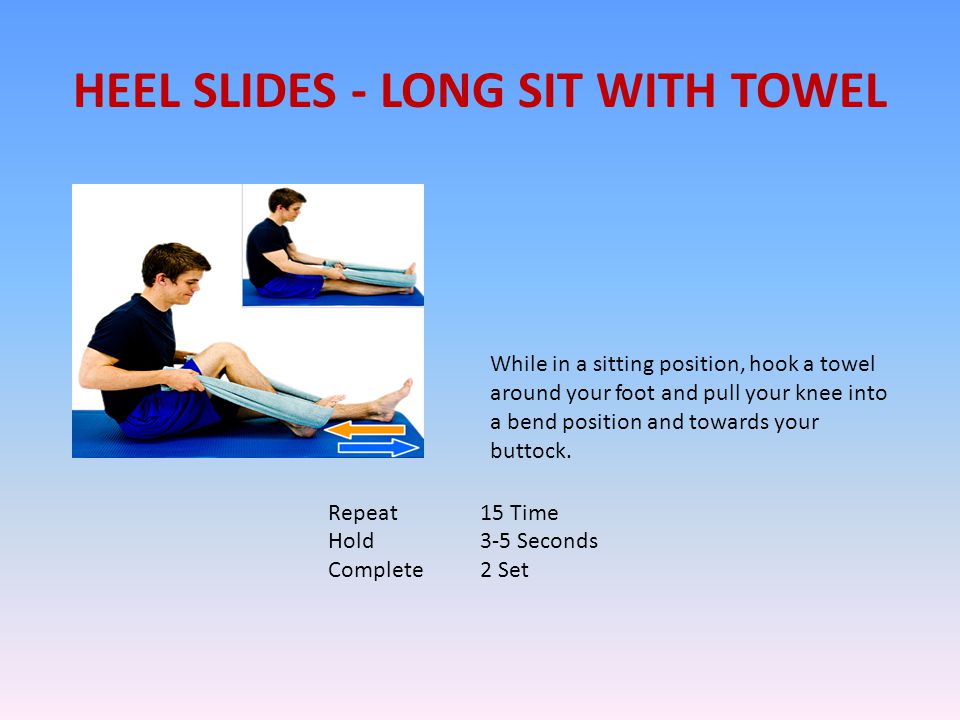
Recumbent Bike Pedal forward for 5 minutes, pedal backwards for 5 minutes. Go at own pace and resistance. Adjust the seat so that patient is seating straight. Patients with lower back problems should have a pillow or a soft medicine ball between the seat and lower mid back
Exercise Treatment Plan for Knee Injury Post Surgery
Edwine Thevenin. Nova Southeastern University. Exsc Dr. Silver. Atlantic Rehab Center.
Adjust the seat so that patient is seating straight. Patients with lower back problems should have a pillow or a soft medicine ball between the seat and lower mid back.
Sitting in the machine, put feet up onto plate positioning them so that your knees are directly over ankles and knees are bent to 90 degrees. Push plate forward until knees are straight but not locked. Slowly return to previous position. Repeat. 10 Times. Complete. 3 Sets. Patients with lower back problems should have a pillow or a soft medicine ball between the seat and lower mid back.
Set all adjustments, including weight. Start with the knees in a flexed position. Push up with equal force with both legs until knee is in full extension. Come back down in a slow controlled movement. (Aggravated knees should extend to about 45°) Repeat. 10 Times. Hold. 3 Seconds. Complete. 3 Sets.
Knee Extension machine needed for this exercise. Set all adjustments, including weight. Start with the knees in a flexed position. Push up with equal force with both legs until knee is in full extension. Come back down in a slow controlled movement. Repeat. 10 Times. Hold. 3 Seconds. Complete. 3 Sets.
* A bar can be used to maintain balance or by lifting one of the handles of the free motion machine to hold on to when doing certain exercises. Such as balancing on the bosu, hydrants, and step up exercises.
Place the theracord on your affected leg, slightly above the crease in the back of the knee. Keep the majority of your weight (85%) on your affected side and bend your knee slightly without allowing your heel to come off the floor or your hips to sway forward. Straighten your knee against the resistance of the band, contracting the muscles in your leg and completely straightening your knee with toes remaining on the floor. Repeat. 10 Times. Hold. 3 Seconds. Complete. 3 Sets.
Start Position: Standing with support for balance if needed. Brace your core and begin to raise your leg to the side, slowly control to start position, repeat. Hip abduction can be done with. Repeat. 10 Times. Hold. 3 Seconds. Complete. 3 Sets.
While sitting with good posture, tie theraband around knees and pull apart. Slowly resume starting position. This position is great for patient with back issue. While standing, raise your leg out to the side. Keep your knee straight and maintain your toes pointed forward the entire time. Use your arms for support if needed for balance and safety.
While standing in front of machine attached the cord to the ankle extend leg behind you. (Advanced patients should squeeze their glut and keep trunk straight.) Keep your knee with cord attached straight the entire time. Do not hyperextend your knee on your stance leg/keep slightly bent. Progression: If you do not feel muscle fatigue by the end of your last set, increase resistance while maintaining proper form. Try not to bend forward at the waist when your extend your leg. Repeat. 10 Times. Hold. 3 Seconds. Complete. 3 Sets.
Lie on your stomach. Lift one leg into the air keeping the knee straight. Both hips should stay on the mat. Lower leg down slowly. While standing, move your leg back as shown. Use your arms for support if needed for balance and safety.
Repeat. 10 Times. Hold. 3 Seconds. Complete. 3 Sets. Sit in a chair with your feet on the floor. Lean shoulders and trunk backwards. Lift one knee up and then lower it slowly, keeping the hip from bending more than 90 degrees.
Adjust weights on machine to accommodate the resistance needed. With the cord around your leg stand straight up and move your leg from the side back towards your body against the resistance of the cord. Repeat. 10 Times. Hold. 3 Seconds. Complete. 3 Sets. Place leg over the handle while hands are holding onto the bars. Slowly bring legs in toward the body. *Use when patient has progressed in their treatment program and is capable of doing so.
Sit on edge of seat with upright posture. Put pillow between knees. While maintaining proper posture squeeze pillow with knees and hold for 5 seconds. Relax 5 seconds and repeat. *Great for patient who recent had surgery. ELASTIC BAND HIP ADDUCTION. Start by standing with your target leg out to the side, as shown, with an elastic band attached. Next, slowly draw your leg inward towards the other side.
With one foot planted on step and other foot in front of step slowly lower planted leg until unplanted foot touches the floor, then raise back up. Repeat. 10 Times. Hold. 3 Seconds. Complete. 3 Sets. If using a foam, position it near a wall. These are great for older patients who has no. Balance/stability.
With a ball up against the wall, bring it into the small of your back. Keeping your back pushed against the ball, bring your feet a step out away from the wall. Feet hip distance apart and pointed straight forward. Bend at your knees, pushing your buttock back towards the ball and lowering yourself downward. Push back upward, straightening your knees. Repeat. Repeat 15 Times. Hold 3-5 Seconds. Complete 2 Sets.
Stand with your back against a wall with your feet in front of you and shoulder width apart. Keep your weight in your heels as your slide your back down the wall until your knees are at a 90 degree ankle. Lift one leg out in front of you keeping your hips level and core tightened. *These can be done with athletes who have progressed in their treatment program or adults who are capable of doing this exercise.
Repeat. 5 Time. Hold Seconds. Complete. 5 Set.
Begin on hands and knees with knees directly under your hips and hands directly under your shoulders. Keep your abdominals tight and engaged throughout this exercise. Raise one leg straight back as pictured without letting your hips drop to one side and without losing your abdominal contraction. Hold for 3 seconds, then return to the start position and repeat with the opposite leg. This is one repetition. Repeat. 10 Times. Hold. 3 Seconds. Complete. 3 Sets.
Repeat. 10 Times. Hold. 3-5 Seconds. Complete. 3 Sets.
Lie down on your back with your knees bent. Place an elastic band around your knees and then draw your knees apart. Repeat. 10 Time. Hold. 2 Seconds. Complete. 3 Set.
While lying on your side with your knees bent and an elastic band wrapped around your knees, draw up the top knee while keeping contact of your feet together as shown. Do not let your pelvis roll back during the lifting movement. Repeat. 10 Time. Hold. 1 Second. Complete. 3 Set.
While lying or sitting with a small towel roll under your ankle, tighten your top thigh muscle to press the back of your knee downward towards the ground. Repeat. 15 Time. Hold. 3 Second. Complete. 2 Set.
Lie on your back and hook a strap/towel/leash around your foot. Keeping the opposite leg straight and flat on table, lift the affected leg towards the ceiling while maintaining a straight knee. You should feel a stretch along the back of the thigh and knee. Repeat 20 Times. Hold 5 Seconds. Complete 2 Sets.
Repeat. 20 Times. Hold. 2 Seconds. Complete. 2 Sets.
While in a sitting position, hook a towel around your foot and pull your knee into a bend position and towards your buttock. Repeat. 15 Time. Hold. 3-5 Seconds. Complete. 2 Set.
Use of ice is very important for swelling and pain control. Ice can be applied whenever needed up to 20 minutes at a time. Lie down with involved leg propped above heart level with support under knee, calf, and ankle.

Knee exercises

👵🏼💪 Total Knee Replacement for Seniors 🦵✨
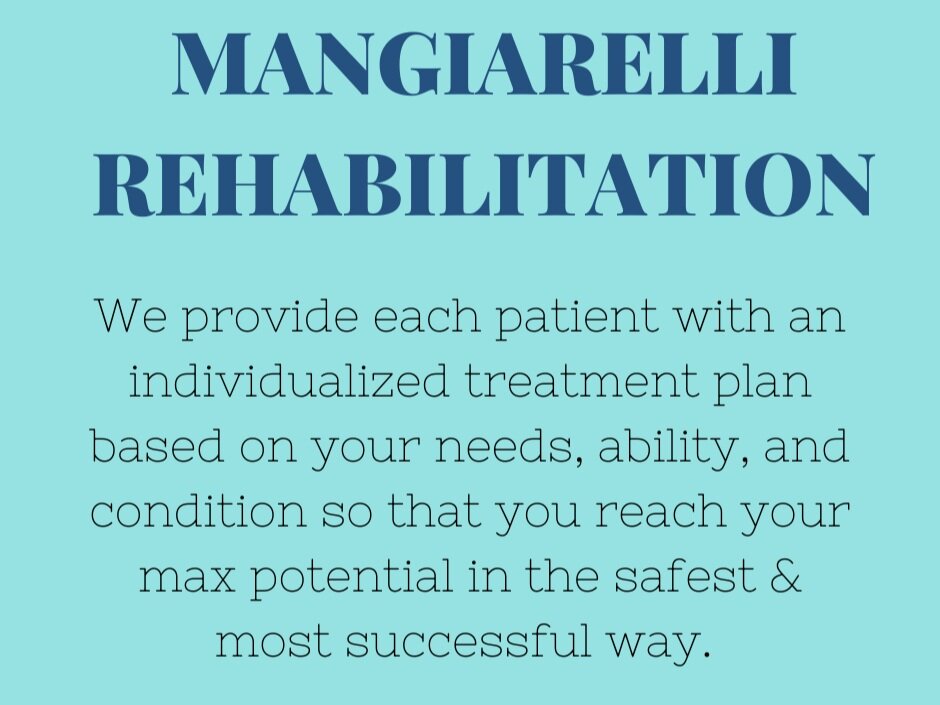
Personalized Physical Therapy: What It Looks Like-Mangiarelli
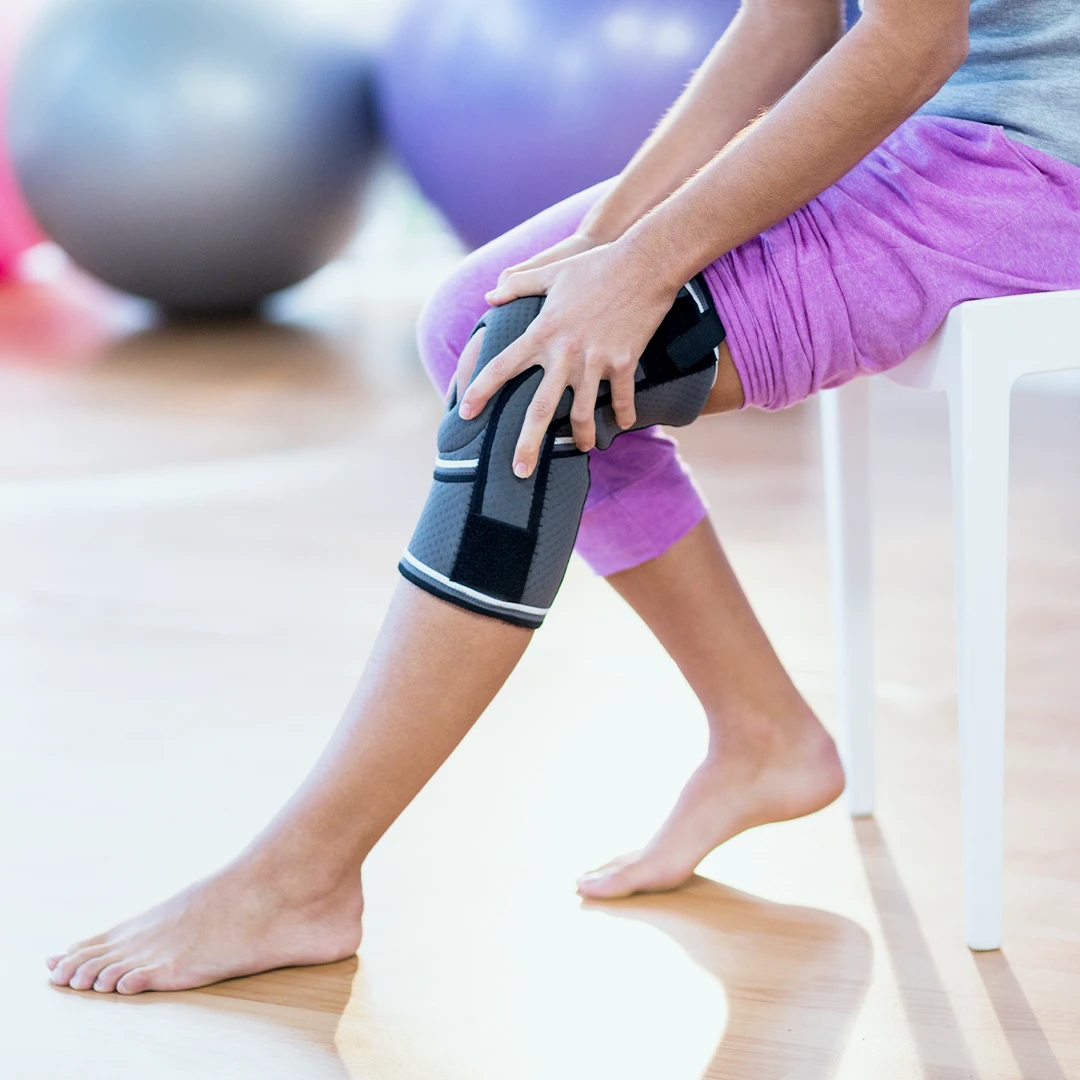
Pre/Post-Surgery Physical Therapy in Falcon, CO - PhysioEdge
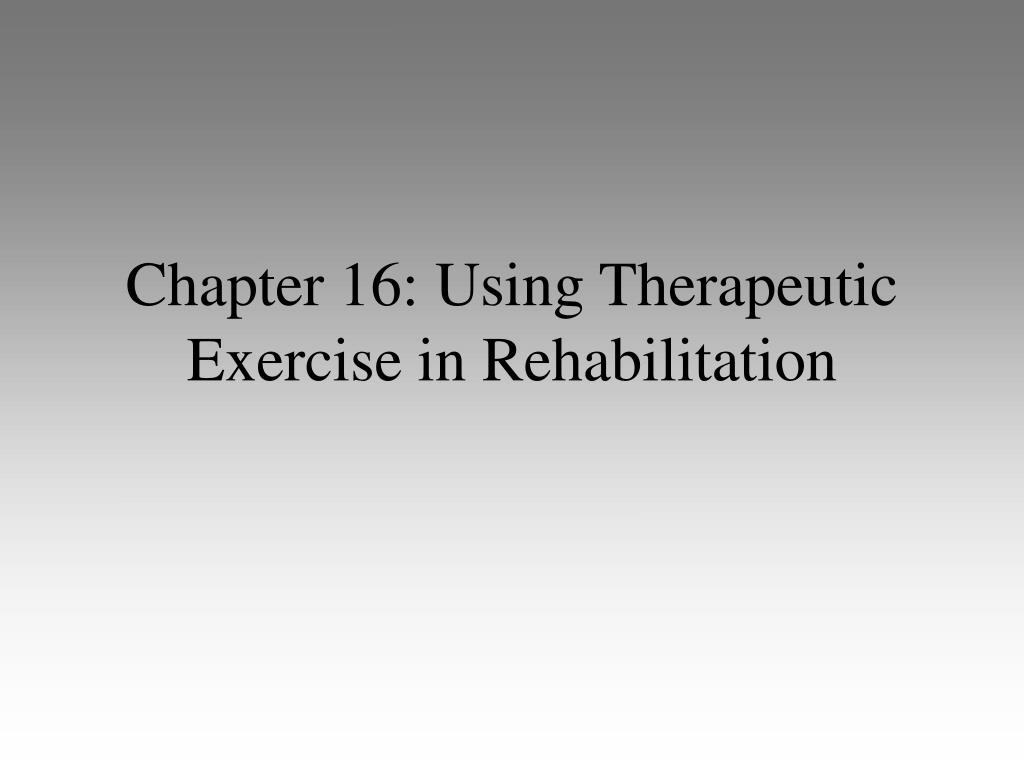
PPT - Chapter 16: Using Therapeutic Exercise in Rehabilitation

Patellar Dislocation and Treatments (Extended Version) See what

5 Exercises to Help with Your C-Section Recovery

How to Prepare for Knee, Hip or Shoulder Replacement Surgery

Joint Replacement Seminar Hip & Knee Replacement Seminar
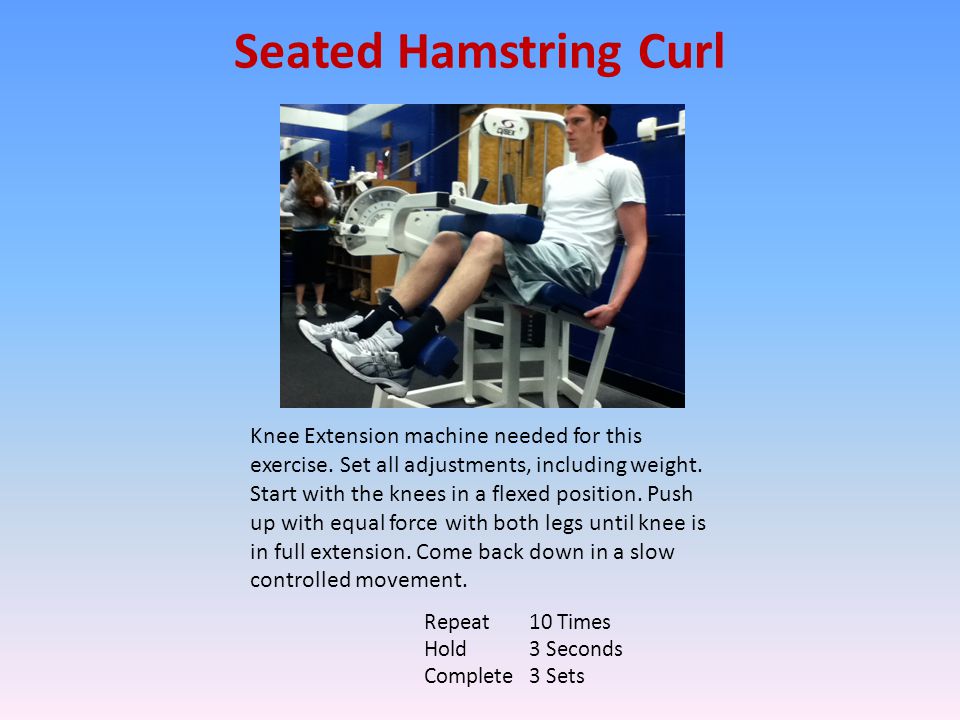
Exercise Treatment Plan for Knee Injury Post Surgery - ppt video

Exercise Treatment Plan for Knee Injury Post Surgery - ppt video

How to Prepare for Knee, Hip or Shoulder Replacement Surgery
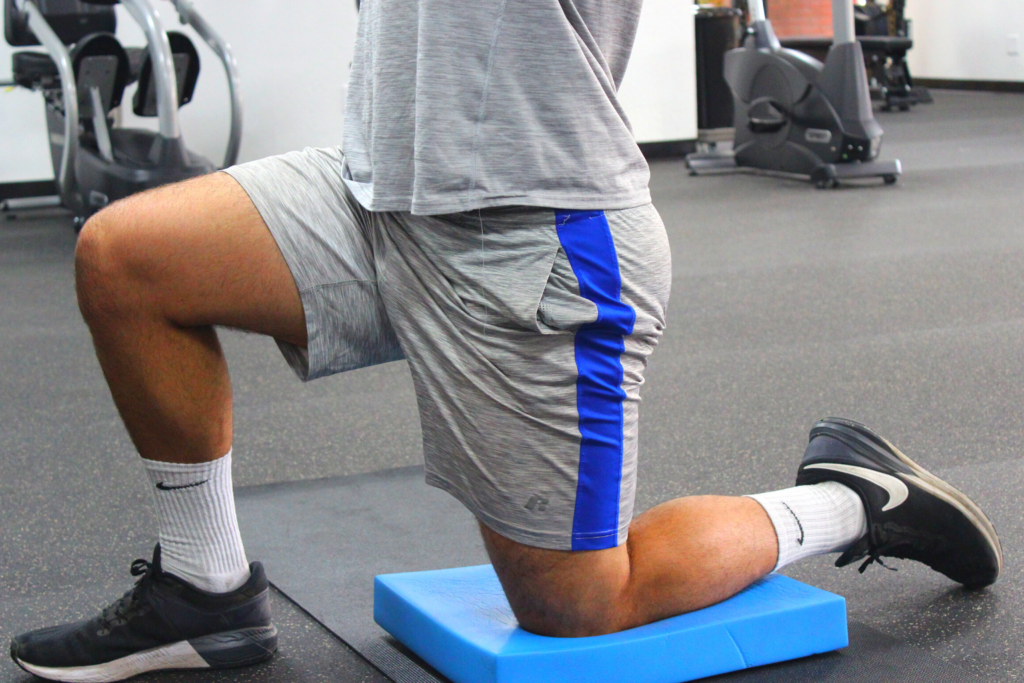
Snapping Hip Syndrome (Coxa Saltans)

Knee Replacement Rehabilitation ppt

Exercise Treatment Plan for Knee Injury Post Surgery - ppt video

